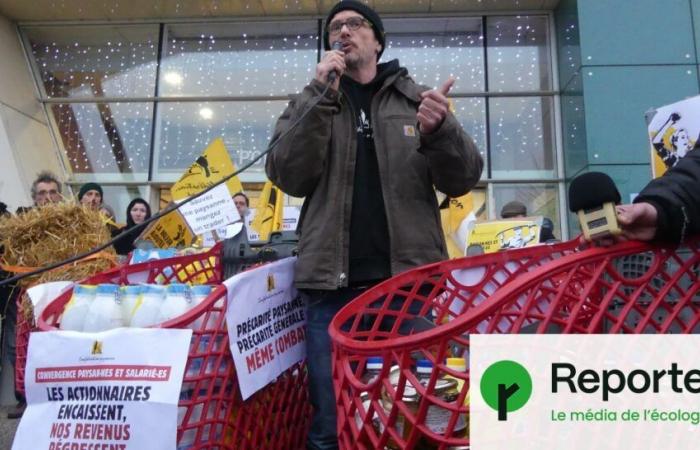Saint-Cyr-sur-Loire (Indre-et-Loire), report
Lactel milk, Puget and Lesieur olive oil, imported fruits, vegetables and honey… On the shelves of the Auchan hypermarket in Saint-Cyr-sur-Loire, near Tours (Indre-et-Loire), around ten activists incognito fill their shopping carts with products that are not chosen at random: all contribute to the farmers' loss of income. That's when festive music resonates at the entrance to the store. Waving flags of the Peasant Confederation, around 70 activists block the checkouts with a row of shopping carts. « We are against the shareholders ! » they chant.
« We come to collect our wheat »
Romain Henry, beekeeper in Touraine and one of the spokespersons for the Confédération paysanne 37, takes the microphone: « We come to collect our wheat, because it is here that part of the peasant income is captured, while we work for 5 euros an hour. » It's the entire agro-industry chain, « which puts the peasants on the brink »which is singled out, in particular companies like the dairy giant Lactalis or the Avril group, led by the president of the FNSEAa productivist agricultural union.
Outside, tractors block the entrances to the parking lot. Store managers come to meet the farmers and tell them that the director is not present. The determined unionist announces the color: « If we don't reach an agreement, we'll occupy the store until tonight. » The objective: to take out the shopping carts they have filled to donate them to associations.
The difficult convergence with employees
Negotiations begin. If the majority of customers welcome the action with philosophy, even support, cashiers and managers adhere to the substance of the message, but not to the mode of action. « Fifteen days before Christmas, you can imagine the price it costs for our store ! I am a farmer's daughter myself and I do as much direct and seasonal sales as possible in the fruit and vegetable section. You are targeting the wrong target »regrets a manager.
« We are not here against you specifically. We denounce the agri-food system which makes its money on the backs of farmers and employees. We would like there to be a convergence of struggles with Auchan employees »replies Christine, producer of organic vegetables and eggs.
The checkouts were blocked with a row of shopping carts.
© Léa Guedj / Reporterre
In this hypermarket, nine employees will lose their jobs, as part of a vast plan of nearly 2,400 layoffs from Auchan. But convergence is visibly laborious. At the national level, an inter-union association was formed between the Peasant Confederation and the unions CGT, FSU and Solidarity. « The challenge now is to make it a reality in the territories, and it is not simple »admet Romain Henry.
4,000 euros of products collected
« OK for twelve shopping carts »the director finally decides by text message. The announcement of the passage of these free shopping carts in « food bank donation » is made over the store's speakers. Romain Henry collects dozens of jars of honey from the Famille Michaud company brands. « French beekeepers are forced to sell at prices lower than their production costs, because these groups have structured an import sector with imported honey which enters at knockdown prices. »sighs the beekeeper.
On December 5, he was present at the action led in Paris by the Peasant Confederation against the free trade agreement between the European Union and Mercosur.
Read also: What the deal UE-Mercosur will put on our plates
After an hour of blockage, the activists took more than 4,000 euros of products which were loaded into vans. They are donated to an association and students in need. Another part will be distributed to employees of the Michelin site in Cholet (Maine-et-Loire), on strike since the beginning of November against the closure of the factory. On December 12, the Confédération paysanne 37 distributed local products to striking railway workers in Indre-et-Loire.
For the agricultural union, the action in Auchan is also part of the campaign for the professional elections of the Chamber of Agriculture next January, « main tool of current system lock »by communicating its demands, such as the ban on purchasing peasant products below their production costs, accompanied by the establishment of a minimum entry price for imported products.
legend







